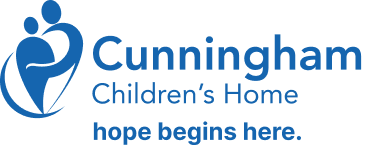Privacy Statement
It is the policy of Cunningham Children’s Home to protect the privacy of its donors and supporters. Any information collected through this website, or through another source, is treated as confidential information and will not be sold, leased or made available to anyone except the Advancement Team, the President/CEO and the Leadership Team for the purposes of communicating with supporters and compiling statistical information or as requested by law. Staff members and volunteers involved in maintaining this information are required to keep all information confidential. Names and addresses of donors and supporters are not made available outside Cunningham Children’s Home organization, except as required by law. Cunningham Children’s Home does not buy or sell mailing lists.
Ethics and Donor Bill of Rights
Cunningham Children’s Home conducts all fundraising and advancement activities in accordance with the Association of Fundraising Professional (AFP) Code of Ethical Principles and Standards. All interactions with donors and/or prospective donors are managed with strict adherence to the principles expressed in the AFP Donor Bill of Rights.
A Donor Bill of Rights
Philanthropy is based on voluntary action for the common good. It is a tradition of giving and sharing that is primary to the quality of life. To assure that philanthropy merits the respect and trust of the general public, and that donors and prospective donors can have full confidence in the not-for-profit organizations and causes they are asked to support, we declare that all donors have these rights:
- To be informed of the organization’s mission, of the way the organization intends to use donated resources, and of its capacity to use donations effectively for their intended purposes.
- To be informed of the identity of those serving on the organization’s governing board, and to expect the board to exercise prudent judgment in its stewardship responsibilities.
- To have access to the organization’s most recent financial statements.
- To be assured their gifts will be used for the purposes for which they were given.
- To receive appropriate acknowledgment and recognition.
- To be assured that information about their donations is handled with respect and with confidentiality to the extent provided by law.
- To expect that all relationships with individuals representing organizations of interest to the donor will be professional in nature.
- To be informed whether those seeking donations are volunteers, employees of the organization or hired solicitors.
- To have the opportunity for their names to be deleted from mailing lists that an organization may intend to share.
- To feel free to ask questions when donating and to receive prompt, truthful and forthright answers.
Developed by: Association of Fund-Raising Professionals, Association for Healthcare Philanthropy, Council for Advancement and Support of Education, Giving Institute: Leading Consultants to Non-Profits
Endorsed by: Independent Sector, National Catholic Development Conference, National Committee on Planned Giving, Council for Resource Development, United Way of America
